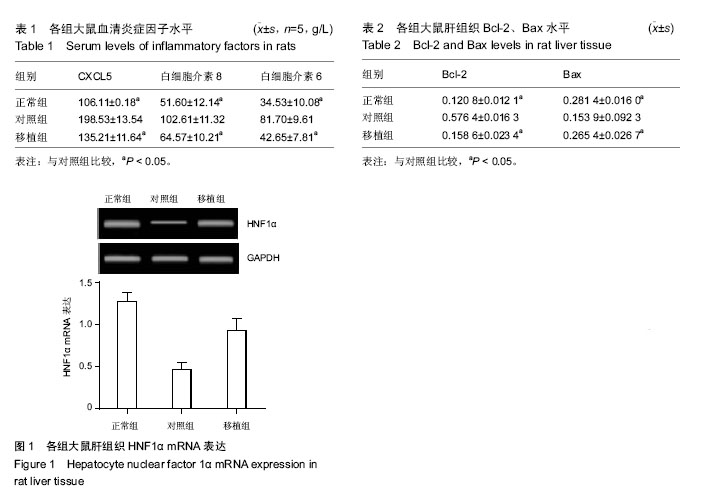| [1] 程龙强,章尧,陈昌杰,等.肝细胞癌中载脂蛋白M,肝受体同系物1和肝细胞核因子1α表达的相关性分析[J]. 癌变•畸变•突变,2010,22(2):130-133.
[2] 李军.嗅鞘细胞蛛网膜下腔移植治疗脊髓损伤的实验研究[D]. 泰安:泰山医学院,2011.
[3] Djouad F, Plence P, Bony C, et al. Immunosuppressive effect of mesenchymal stem cells favors tumor growth in allogeneic animals. Blood. 2003;102(10):3837-3844.
[4] 邵志红,王培军,李铭华,等.大鼠骨髓间充质干细胞移植对Walker-256 肝癌生长影响的实验研究[J].中华医学杂志,2009,89(7):491-496.
[5] Li GC, Ye QH, Xue YH, et al. Human mesenchymal stem cells inhibit metastasis of a hepatocellular carcinoma model using the MHCC97-H cell line. Cancer Sci. 2010;101(12):2546-2553.
[6] Zhu W, Xu W, Jiang R, et al. Mesenchymal stem cells derived from bone marrow favor tumor cell growth in vivo. Exp Mol Pathol. 2006;80(3):267-274.
[7] Lu YR, Yuan Y, Wang XJ, et al. The growth inhibitory effect of mesenchymal stem cells on tumor cells in vitro and in vivo. Cancer Biol Ther. 2008;7(2):245-251.
[8] 乔玲,赵铁军,山长亮,等.人间充质干细胞抑制肝癌细胞增殖的作用及其基因表达谱分析[J].中国生物化学与分子生物学报,2007,23(12):1037-1044.
[9] 陈双庆,王培军,李铭华,等.磁标记骨髓间充质干细胞对肝细胞癌的抑制作用[J].临床放射学杂志,2009,28(10): 1454-1458.
[10] 王光.雌激素缺乏导致的骨质疏松环境中TNF-α通过MiR-21影响小鼠骨髓间充质干细胞成骨分化能力的研究[D].西安:第四军医大学,2012.
[11] 韩志鹏.炎症微环境中间充质干细胞影肿瘤生长的机制研究[D].上海:第二军医大学,2011.
[12] 陈雯,朱峰,郭光华,等.骨髓间充质干细胞对烟雾吸入性损伤兔早期炎症因子分泌的影响[J].中国危重病急救医学, 2011,23(1):21-23.
[13] 王春苗.IL-1β联合TNF-α预处理骨髓间充质干细胞促进血管细胞黏附分子-1的表达及改善缺血后心功能[D].合肥:安徽医科大学,2014.
[14] Laskin DL.Macrophages and inflammatory mediators in chemical toxicity: a battle of forces. Chem Res Toxicol. 2009;22(8):1376-1385.
[15] Helk E, Bernin H, Ernst T, et al. TNFα-mediated liver destruction by Kupffer cells and Ly6Chi monocytes during Entamoeba histolytica infection. PLoS Pathog. 2013;9(1):e1003096.
[16] Lucey MR, Mathurin P, Morgan TR. Alcoholic hepatitis. N Engl J Med. 2009;360(26):2758-2769.
[17] Xu L, Yin W, Sun R, et al. Kupffer cell-derived IL-10 plays a key role in maintaining humoral immune tolerance in hepatitis B virus-persistent mice. Hepatology. 2014;59(2):443-452.
[18] Grivennikov SI, Greten FR, Karin M. Immunity, inflammation, and cancer. Cell. 2010;140(6):883-899.
[19] Park EJ, Lee JH, Yu GY, et al. Dietary and genetic obesity promote liver inflammation and tumorigenesis by enhancing IL-6 and TNF expression. Cell. 2010; 140(2):197-208.
[20] Ben-Neriah Y, Karin M. Inflammation meets cancer, with NF-κB as the matchmaker. Nat Immunol. 2011; 12(8):715-723.
[21] 付玉华,范丽,于丽,等.肝癌患者脂肪干细胞重编程为诱导多潜能干细胞[J].第二军医大学学报,2011,32(4):382- 386.
[22] Strioga M, Viswanathan S, Darinskas A, et al. Same or not the same? Comparison of adipose tissue-derived versus bone marrow-derived mesenchymal stem and stromal cells.Stem Cells Dev. 2012;21(14):2724-2752.
[23] 吴林,宦宏波,吴黎雳,等.炎症因子与肝癌干细胞标志在肝癌诱导过程中的相关性研究[J].实用临床医药杂志, 2014, 18(7):1-6.
[24] 郑飞,周文平,张巍,等.大鼠肝癌诱导过程中肝癌干细胞标志及炎症因子的动态变化[J]. 中国组织工程研究,2015, 19(19):3005-3009.
[25] Hara S, Umeyama K, Yokoo T, et al. Diffuse glomerular nodular lesions in diabetic pigs carrying a dominant-negative mutant hepatocyte nuclear factor 1-alpha, an inheritant diabetic gene in humans. PLoS One. 2014;9(3):e92219.
[26] 马晓燕,曹定睿,苏丹丹等.舒芬太尼对肝癌大鼠肝细胞凋亡的影响[J].中国现代药物应用, 2014,8(8): 243-244.
[27] 连梓敏,曹定睿,王泓源,等.丙泊酚对Wistar大鼠肝癌模型中Bax与Bcl-2表达的影响[J]. 基础研究, 2014,11(12): 28-30.
[28] Sutcliffe R, Maguire D, Murphy P, et al. Detection and clinical significance of bone marrow micrometastases in patients undergoing liver transplantation for hepatocellular carcinoma. Transplantation. 2005; 80(1): 88-94.
[29] Naugler WE, Sakurai T, Kim S, et al. Gender disparity in liver cancer due to sex differences in MyD88- dependent IL-6 production. Science. 2007;317(5834): 121-124.
[30] Korkaya H, Kim GI, Davis A, et al. Activation of an IL6 inflammatory loop mediates trastuzumab resistance in HER2+ breast cancer by expanding the cancer stem cell population. Mol Cell. 2012;47(4):570-584.
[31] Jin X, Kim SH, Jeon HM, et al. Interferon regulatory factor 7 regulates glioma stem cells via interleukin-6 and Notch signalling. Brain. 2012;135(Pt 4): 1055-1069.
[32] Budhu A, Wang XW. The role of cytokines in hepatocellular carcinoma. J Leukoc Biol. 2006; 80(6): 1197-1213.
[33] Li GC, Ye QH, Xue YH, et al. Human mesenchymal stem cells inhibit metastasis of a hepatocellular carcinoma model using the MHCC97-H cell line. Cancer Sci. 2010 Dec;101(12):2546-2453.
[34] 邵志红,王培军,李铭华,等.大鼠骨髓间充质干细胞移植对Walker-256 肝癌生长影响的实验研究[J].中华医学杂志, 2009,89(7):491-496. |
.jpg)

.jpg)